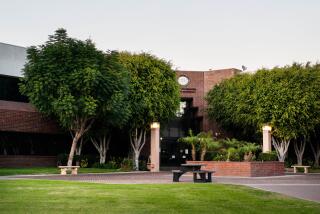Retired UCLA professor pledges $50 million to Westwood campus
Retired UCLA professor Paul I. Terasaki, who spent three years in a World War II internment camp for Japanese Americans and later became a world-renowned expert in organ transplantation, has pledged $50 million to the Westwood campus. The gift will fund a new life sciences building and an endowed chair in surgery.
Terasaki, who is 80 and lives in Brentwood, said in an interview Wednesday that he owes much of his academic and business success to UCLA and wants to repay the school.
“All of it had its origins in UCLA,” he said as he prepared to fly to Japan to deliver a lecture on bone marrow transplants.
His donation, to be formally announced Thursday, is among a handful of the largest single gifts in UCLA’s history, campus officials said. The largest was $200 million from entertainment industry mogul David Geffen to UCLA’s medical school in 2002.
In the 1960s, Terasaki developed what became a widely used test for tissue typing that is crucial in determining matches between donor organs and transplant recipients.
He and former students subsequently founded a company that was highly successful in creating and marketing tissue-typing tests.
Terasaki also established the UCLA Kidney Transplant Registry, which was the first of its kind in the world..
He said much of his $50-million pledge would be paid from his estate after his death and that of his wife, Hisako.
A new life sciences building, which is expected to be completed in the fall, will receive $48 million and be named after him. The other $2 million will endow a chair in surgery that will initially support fellowships in transplantation.
UCLA Chancellor Gene Block expressed gratitude for the gift and described Terasaki as “an inspirational role model and a great scientist.”
During World War II, Terasaki’s immigrant family was forced from its Boyle Heights home to the Gila River, Ariz., detention camp for Japanese Americans.
The family later moved to Chicago, and he eventually earned his bachelor’s and master’s degrees and a doctorate in zoology at UCLA. Three of his four children are UCLA alumni.
Terasaki said Wednesday that his teenage years in the camp had helped push him to “try harder to get somewhere.” He urged all young people, despite any setbacks, “to contribute to society and do something worthwhile.”
In 2006, he and his wife contributed $5 million to UCLA to promote understanding between the United States and Japan through a campus Japanese studies center that has been named for them.
In 1987, Terasaki and UCLA were criticized by a state auditor general’s report that alleged conflict-of-interest rules and University of California policies were violated when the professor began to privately produce a medical test for transplant compatibilities.
Terasaki, who received no discipline or penalty in the matter, denied any wrongdoing and said he paid $500,000 to UCLA for the rights to the device he created in a university lab.
More to Read
Sign up for Essential California
The most important California stories and recommendations in your inbox every morning.
You may occasionally receive promotional content from the Los Angeles Times.











